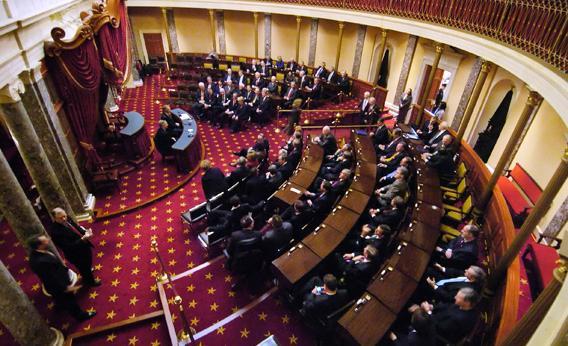Keeping the government running, ensuring that the Import-Export Bank continues to function, sending a jobs package over the Senate, naming post offices, and preparing for the Benghazi committee hearings are all at the top of the congressional "to-do" list over the next twelve days. But what's keeping everybody awake at night is national security; more specifically, what President Barack Obama plans to do in order to contain the Islamic State of Iraq and the Levant, roll back their gains and pick off their leadership before degrading and defeating them. Administration officials will be spending a lot of time on Capitol Hill this week briefing the full House and Senate, along with the national security committees on both sides of the Capitol Building.
President Obama will be speaking to the American people this Wednesday, September 10, on what his comprehensive strategy against ISIL will look like: what the objectives are, what tools will be used to meet them, and how long the campaign will last. Ordinarily when a president finds himself on the eve of an expansive military campaign, you would expect him to ask Congress for the statutory authority to use military force -- just as President Obama did last summer when he was formulating a blueprint to retaliate against the Assad regime for its use of chemical weapons on civilians outside Damascus. Yet when it comes to a dire national security threat like ISIL, it appears that the White House has chosen to refrain from going to Congress directly. Robert Costa and Ed O'Keefe of the Washington Post have reported that "[t]he White House has not made any official moves that would indicate that President Obama will be seeking congressional authorization for military strikes against the Islamic State."
What this means from the standpoint of war powers is quite clear: Congress will be playing a passive role and giving the executive branch the benefit of the doubt if the U.S. air campaign is expanded into Syria. The House and Senate leadership have indicated that they are not at all prepared to hold an up-or-down vote on a formal authorization for the use of military force (AUMF) in an election year, which ironically provides President Obama with more political cushion to invoke his Article II powers as Commander-in-Chief.
The congressional leadership may not want to schedule a floor debate and vote on military authorization, but some lawmakers are not particularly satisfied with that decision. Representative Eliot Engel (D - NY), the ranking member of the House Foreign Affairs Committee, has intimated that getting congressional approval for an anti-ISIL military campaign would be politically smart for the president. Senator Bob Corker (R- TN), the ranking member of the Senate Foreign Relations Committee agrees: "For the American people's sake, Congress should weigh in."
If Senator Harry Reid and Speaker John Boehner reevaluate their present course of action and decide that Congress should have some skin in the game, there are no shortage of resolutions currently available to begin the debate:
1) Senator Bill Nelson's draft AUMF would allow the president to use "appropriate force against the Islamic State of Iraq and the Levant in order to prevent terrorist attacks on the people and interests of the United States and our allies." To prevent another situation where an AUMF lasts well into the future (like the resolution passed by Congress in September 2001), the authority would automatically be revoked in three years by a sunset clause.
2) Senator James Inhofe pushed his own version of an ISIL AUMF on the same exact day as Sen. Nelson. Inhofe takes a harder line than his Democratic friend from Florida, and would presumably provide the president with the power to strike the terrorist group wherever it resides at any given time. The authorization in Inhofe's bill is not limited by timetables.
3) Rep. Frank Wolf has introduced the broadest and least constrained authorization for military force that is now available for consideration. The language as written would essentially give the Commander-in-Chief unlimited and boundless authority to aggressively pursue all terrorist groups, entities, individuals associated with terrorism, and countries supportive of terrorist operations anywhere in the world. The bill, in fact, is so wide that Wolf's own colleagues in the House have shied away from sponsoring it.
4) Rep, Darrell Issa, the combative prosecutor of the Obama White House and Chairman of the House Oversight Committee, is prepared to file his own piece of legislation that "would give the President a 120 day authorization to use force against ISIL in order to protect American interests and prevent the group's further expansion." There is only one caveat: "Within 60 days of passage, the President has to present to Congress a comprehensive strategy to stabilize the region and defeat the ISIL threat."
All of this work may be nil if Obama simply chooses to consult with members of Congress before executing his counterterrorism strategy. And without approval from House and Senate leadership, Congress will be unable to even debate the resolutions now in the drawer. But it's one small piece of good news that some lawmakers, three Republicans and one Democrat, are trying to make sure that the people's representatives are expressing their Article I powers to the fullest extent possible.

